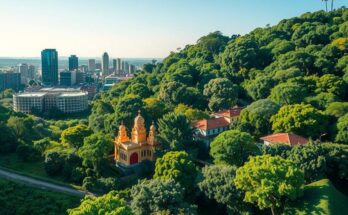Syria’s interim President Ahmed Sharaa is negotiating with Russia regarding the future of military bases in exchange for financial support and diplomatic recognition. The relationship has shifted since Assad’s fall, with former adversaries now seeking beneficial terms with Moscow to aid in Syria’s recovery following extensive war devastation. The discussions involve crucial matters such as debt cancellation and the repatriation of Syrian funds held in Russia.
For years, Russian military personnel from the Hmeimim Air Base in Syria had free rein in coastal cities, supporting the regime of Bashar al-Assad by launching airstrikes against Islamist rebels. However, after Assad’s departure and with the rise of the Hayat Tahrir al-Sham (HTS) force, former rebels now monitor the entrances of these military installations, requiring notification before any Russian convoys can depart.
The fate of the Hmeimim Air Base and the Tartous Naval Base rests with Syria’s interim President Ahmed Sharaa, who aims to renegotiate the long-standing agreements that granted Russia military access to these sites. Sharaa does not seem inclined to expel Moscow entirely, suggesting that Russia’s continued presence may be secured in exchange for diplomatic support and financial assistance crucial for Syria’s recovery.
Following Assad’s flight to Russia, the regime, previously under relentless attack by Russian forces, now finds itself negotiating terms with Moscow. Reports share insights into discussions between Sharaa and a Russian envoy regarding Syria’s overwhelming debt and the repatriation of funds alleged to be held by Assad in Russia, highlighting the complexities of these diplomatic interactions.
Despite the challenges posed by ongoing sanctions from the EU and the U.S., both parties recognize benefits in reconciliation. Syria’s leadership is eager for Russian supplies of weapons, fuel, and food, underscoring a willingness to stabilize relations despite the historical animosity. A Damascus-based diplomat remarked, “Moscow still has something to offer for Syria,” emphasizing Russia’s significant role.
During the January meeting in Damascus, Sharaa raised the matter of debt incurred with Russia under Assad’s administration and sought new terms for future cooperation. The discussions also touched upon Assad’s return, though officials noted this concern did not present a major hurdle to reestablishing ties. Russia, committed to maintaining its influence in Syria, has no intention of extraditing Assad, who remains an integral part of its strategy.
Following the diplomatic meeting, Syria’s government called for addressing previous issues and seeking compensation for damages caused by Russian military actions. Overall, the conversation was considered constructive, with Kremlin officials indicating their ongoing engagement with the Syrian administration. Former Kremlin adviser Sergei Markov indicated that the new leadership in Syria sees Russia as an ally rather than a foe.
Sharaa has articulated the importance of Russia’s support for Syria’s vital interests, especially amidst a regional landscape marked by the presence of U.S., Turkish, and Israeli forces. With reconstruction costs estimated at $400 billion, the Syrian leadership seeks reparations while acknowledging Russia’s humanitarian role rather than direct responsibility for wartime devastation.
The implications of Assad’s fate, particularly regarding individuals sheltered in Russia, present a delicate matter for Russian diplomats, emphasizing the need for continuity in alliances even amidst shifts in leadership dynamics. The ongoing Syrian war has left significant destruction and displacement in its wake, with regions near Russian bases starkly demonstrating the consequences of conflict. Vital to note, local interactions with Russian soldiers have diminished, indicating a shift in the on-ground realities surrounding these military installations.
In summary, Syria seeks to navigate its post-Assad era by negotiating the terms of Russian military presence in exchange for financial aid and diplomatic support. The new leadership is engaging with Russia to address past debts and potential reparations, recognizing the importance of maintaining a strategic alliance. Ultimately, the future of Syria’s relations with Moscow will hinge on these complex negotiations, which could shape the trajectory of recovery in the war-torn nation.
Original Source: stratnewsglobal.com




